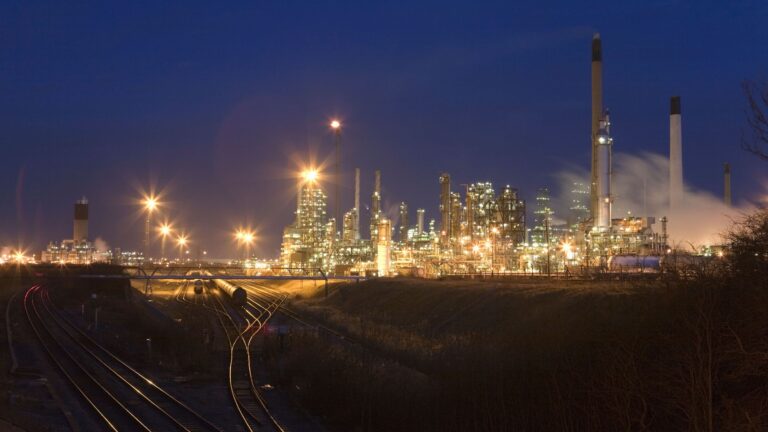
At this time of the year we normally deliver a light-hearted “summer special”. That will have to wait, because at the start of July, the UK fuel sector was rocked by the news that State Oil – the owners of Prax Petroleum, the Lindsey Oil Refinery and various North Sea exploration assets – had gone into Administration.
Not too much information is yet available around the company’s demise, but the devastating impact on laid-off employees is very real, as is HMRC’s unpaid £250m tax bill! In addition, there are now understandable, long-term worries around the increasingly parlous state of UK refining.
“THAT STATE OIL, PRAX AND ALL ITS OTHER SUBSIDIARIES WERE A HOUSE OF CARDS IS BEYOND DOUBT.”
Portland first came across State Oil in 2003, when they owned a handful of petrol stations around the M25. At the time, the company was looking for a “branding only” retail deal (whereby a well-known petrol brand is used on the site, but the petrol station itself sources its own fuel).
Not much thought (by me at least) was given to this deal or indeed the small company that seemed to have worked out its own supply chain and as such, was operating independently of the oil majors (highly unusual then, as it is now).
In the 22 years that followed, this same, small independent company went on to first become one of the largest importers of fuel into the UK, then a refinery owner, and finally, an operator of North Sea exploration assets.
Between 2010 and 2020, the revenues of State Oil surged tenfold, a trajectory that clearly, with hindsight, was too good to be true! It should be noted that rumours concerning the funding of State Oil have long swirled around our industry, and questions on how a small petrol retailer built a $10bn “Empire” in 20 years, never really went away. In fact, one Non-Executive Director appointed to the Board of State Oil, confided in Portland that after 3 years of service, he still didn’t fully understand the financial model and ultimately decided to hand in his resignation accordingly.
Administrators are understandably keeping tight-lipped, but what we do know is that by 2024, the company was paying staggering annual interest payments of £125m on its debts. Maybe to understand how this can possibly happen, one should remember the old joke beloved of New York moneylenders; “if you owe the bank $1m and you can’t pay, then you have a problem. If you owe the bank $10m and you can’t pay, then the bank has a problem!!”
That State Oil, Prax and all its other subsidiaries were a house of cards is beyond doubt. Nonetheless, there still has to be a major question around how a refinery that was making record margins only 3 years ago, could suddenly find itself in such financial difficulty.
Remember that in 2022 (following Russia’s invasion of Ukraine), refining margins went through the roof and even if Lindsey is the smallest UK refinery, 85,000 barrels per day at an average refining margin of $20 per barrel (peaking at $42 / bbl), equated to gross profits of $1.7m per day!! Where did all the money go? Did it ever even arrive in the coffers of State Oil in the first place?!
Whether or not we get answers to these questions (seems unlikely), will not change the fact that the UK now finds itself in an extremely perilous position when it comes to national oil refining capacity. It was only in December, that Scotland’s only refinery (Grangemouth) ceased operations.
As recently as 15 years ago, the UK had 9 refineries (in the 1970s there were over 20!), but should Lindsey end-up closing (and this is not yet guaranteed), the country will only have 4 refineries left (Exxon Fawley, Valero Pembroke, Essar Stanlow and P66 Humber). The current Government is very keen to talk about energy resilience, but for the 6th biggest economy on earth to only have 4 oil processing plants, hardly screams self-sufficiency!
“FOR THEIR EMPLOYEES, THE UK FUEL INDUSTRY AND THE COUNTRY’S ENERGY SECTOR, THE
WHOLE THING IS A DOG’S BREAKFAST.”
The failure of State Oil and possible closure of Lindsey is a sorry state of affairs; not for the previous Directors of course, as they felt able to award themselves over £10m in dividends in the run-up to the liquidation. But for their employees, the UK fuel industry and the country’s energy sector, the whole thing is a dog’s breakfast. Fundamentally, State Oil / Prax went way beyond their levels of knowledge and competency and then over-reached in spectacular fashion.
The gut feel within the industry was that something wasn’t right, but we all either turned a blind eye or seemed fairly happy for the company’s progress to go unchecked. From an employee perspective, salvation might have come from a government that decided nationalising a refinery supplying 8% of UK fuel was in the country’s best interests – in the same way it had already rescued the nearby Scunthorpe steel works.
However, on the 22nd July, it was announced that Lindsey refinery would definitely close, and the Department of Energy would not step in. Ultimately there was no appetite – from private or public entities – to take on a 60 year old asset that had been run into submission by the previous owners and was now losing significant amounts of money.

Portland
www.stabilityfromvolatility.co.uk
Image credit: Alamy, Portland
